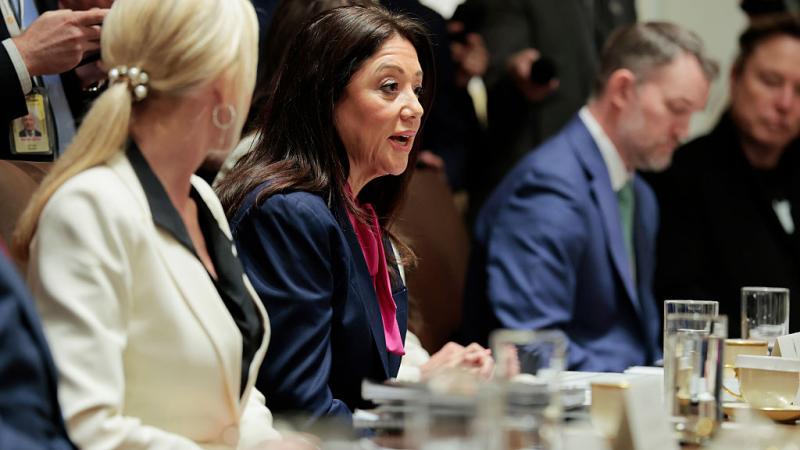Feds scaremonger to increase bivalent booster uptake as internal 'credibility' warnings surface
FDA's advisers warn they want to see evidence that new vaccine formulations do more than raise antibody levels. Pharmacy caught inventing side effects for correct use of ivermectin, showing long tail of feds' demonization of safe antiviral.
Facing a 15% bivalent-booster uptake rate several months after the U.S. authorized Omicron-Wuhan vaccines without human trial data, the Department of Health and Human Services is trying to scare Americans into getting jabs that lack a clear advantage over original Wuhan-only boosters.
HHS has recently gone on a social media tear, telling people at all ages and risk levels that they aren't protected without a bivalent booster.
"It's impossible to predict how COVID will affect your kids," one HHS message says, claiming children are at risk from "COVID's worst outcomes" without a bivalent booster. Another targets low-risk college students.
An all-ages tweet tells vaccinated and previously infected people their protection wanes over time, warning that without a bivalent booster, they risk "severe illness, hospitalization and death." HHS did not answer Just the News queries for the evidence behind its claims.
The feds' uphill battle for boosting confirms newly disclosed warnings from Marion Gruber, onetime director of the FDA's Office of Vaccines Research and Review, who along with her deputy Philip Krause left the agency in late 2021 shortly after the original boosters were authorized.
Public records posted by Endpoints News Tuesday show the 32-year FDA veteran pushing back on the "hyper-accelerated" review of Pfizer's nonemergency Comirnaty COVID vaccine sought by Peter Marks, chief of the Center for Biologics Evaluation and Research, and acting Commissioner Janet Woodcock.
Gruber warned such a review would be weaker and was "more likely to undermine confidence" in COVID vaccines and "the FDA's credibility." She mentioned its "increasing evidence of association" with myocarditis, "especially in young males" but other ages as well.
Marks told Woodcock to bear down on Gruber and her staff, who showed "a lack of urgency and responsiveness to the public health imperative to save lives."
The FDA declined to comment to Endpoints News on the emails but emphasized that "at no time was there disagreement" about fully approving Comirnaty. It acknowledged FDA staff "were under immense pressure" to complete the review "as rapidly as possible" under agency standards.
Skepticism of the feds' evidence is increasingly mainstream. Weill Cornell Medical College immunologist John Moore told NPR no one has put forth "solid data about the performance of the bivalent boosters," which he believes "trends towards ... little if no better" protection.
Wall Street Journal science editorialist Allysia Finley accused the feds of "deceptive advertising" for the bivalents, ignoring both independent research on "immune imprinting" and CDC research on the low effectiveness of bivalents at peak protection.
"Many of the same experts who trashed observational studies supporting hydroxychloroquine and ivermectin now flog intrinsically flawed studies on bivalent boosters," she wrote. "After zealously promoting the bivalents, they may be seeking vindication. But science isn’t about vindication."
Scripps Research Translational Institute Director Eric Topol sought to discredit Finley in a tweet thread, promoting studies he claims show bivalents provide "enhanced, ~80% protection from hospitalizations and deaths."
Other users quickly pushed back, citing underlying health differences in who gets boosted, the lack of an unvaccinated control group, the limitation to older people and lack of randomized controlled trials.
Despite research suggesting post-primary series doses may actually weaken immune systems and vaccine effectiveness goes negative after as little as two months for children and around seven months for vaccinated adults, the FDA is considering a new strategy that recommends annual COVID vaccines designed to match expected strains, much as with flu vaccines.
It's putting the proposal before its Vaccines and Related Biological Products Advisory Committee meeting, which starts Thursday. An anonymous federal official told NPR the goal was making vaccines "simpler and hopefully therefore more appealing."
Some VRBPAC members told NPR they were resistant. New England Journal of Medicine Editor-in-Chief Eric Rubin said he wants "more evidence of clinical efficacy" — reductions in infections, symptoms, hospitalization and deaths — rather than the FDA's default of antibody levels.
Paul Offit, the vaccine specialist at Children's Hospital of Philadelphia, questioned "chasing these variants, which are evanescent and are often gone by the time you've created the vaccine."
Agency watchers noted the FDA didn't ask for VRBPAC's input or questions specifically about Pfizer's required study of "subclinical myocarditis" in Wuhan-boosted young adults, which was due Dec. 31, or the "stroke signal" it found and then quickly dismissed in elderly recipients of Pfizer's bivalent.
The FDA did not respond to Just the News requests Monday and Tuesday for its explanation of the omissions from the briefing materials.
Thai and Swiss research suggests post-booster undetected heart problems "might be as much as 100 times more common" in young men than in the general population, University of California epidemiologist Vinay Prasad wrote in his newsletter Monday.
The proposed annual COVID vaccine schedule is silent on the myocarditis risk from a "perpetual" strategy, he wrote.
Echoing Rubin and Offit, Prasad cited no proposed "randomized trials to ensure annual boosters actually lower severe disease in healthy young adults and kids" and failure to recognize not only that updated jabs will "always be chasing the last variant" but "cannot even slow spread."
The feds' misleading representations on the safety of ivermectin to treat COVID, flagged by a judge last fall, also continue to stalk would-be customers seeking the antiviral, whose inventors won a Nobel Prize in 2015.
Pharmacy staff at Texas grocery chain HEB refused to fulfill an ivermectin prescription for a customer unless she confirmed it wasn't to treat COVID, according to a surreptitious recording posted by Mary Talley Bowden, one of the doctors suing the FDA for allegedly blocking their use of ivermectin to treat patients.
Staff told the customer the American Pharmacists Association and "medical licensing board" had "asked us to stop" fulfilling ivermectin prescriptions intended to treat COVID. APhA warned against ivermectin as COVID treatment in fall 2021 but referred to non-human dosages and overdoses, not prescriptions taken correctly.
Side effects include "defecating the lining of your intestine, possible blindness, [and] visual problems" from taking a prescribed dosage, staff falsely told the customer. HEB has not answered Just the News queries on whether this was an isolated incident or the result of top-down corporate policy and talking points.
YouTube blocked the recording soon after Bowden posted it for violating its medical misinformation policy, but YouTube owner Google told Just the News Tuesday it had made an error and reinstated the video.
The Facts Inside Our Reporter's Notebook
Links
- 15% bivalent-booster rate
- one HHS message says
- low-risk college students
- they risk "severe illness, hospitalization and death."
- Endpoints News
- John Moore told NPR
- Allysia Finley accused the feds of "deceptive advertising"
- CDC research on the low effectiveness of bivalents at peak protection
- promoting studies he claims show bivalents provide
- underlying health differences in who gets boosted
- lack of an unvaccinated control group
- limitation to older people and lack of randomized controlled trials
- may actually weaken immune systems
- as early as two months for children
- around seven months for vaccinated adults
- proposal
- anonymous federal official told NPR
- Agency watchers noted the FDA didn't ask
- "stroke signal" it found and then quickly dismissed
- Vinay Prasad wrote in his newsletter Monday
- flagged by a judge last fall
- inventors won a Nobel Prize in 2015
- surreptitious recording
- suing the FDA for allegedly blocking their use of ivermectin to treat patients
- APhA warned against ivermectin as COVID treatment
- YouTube blocked the recording
- reinstated the video
















